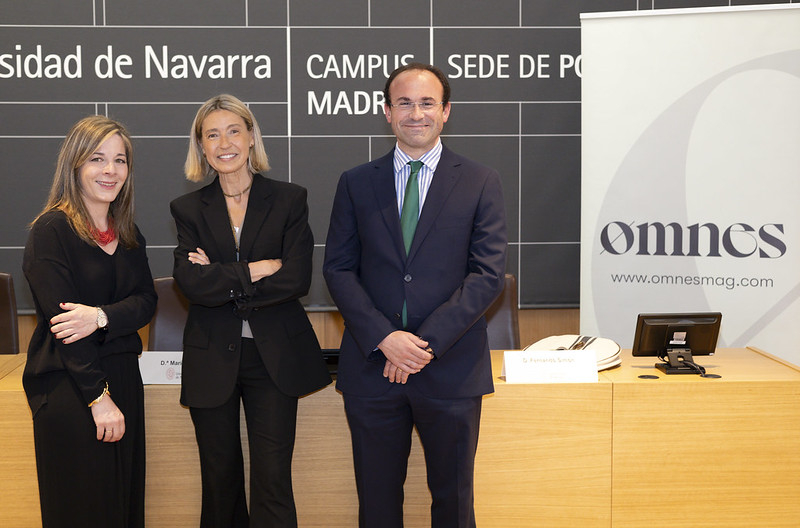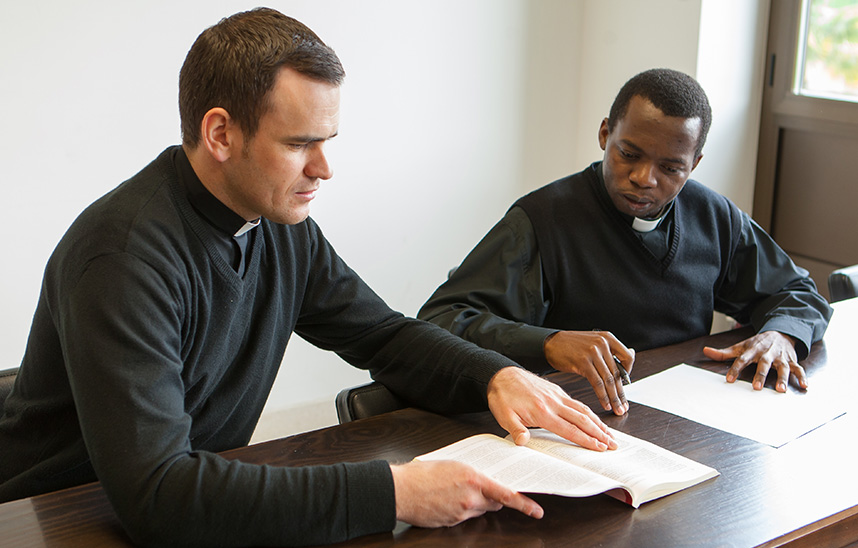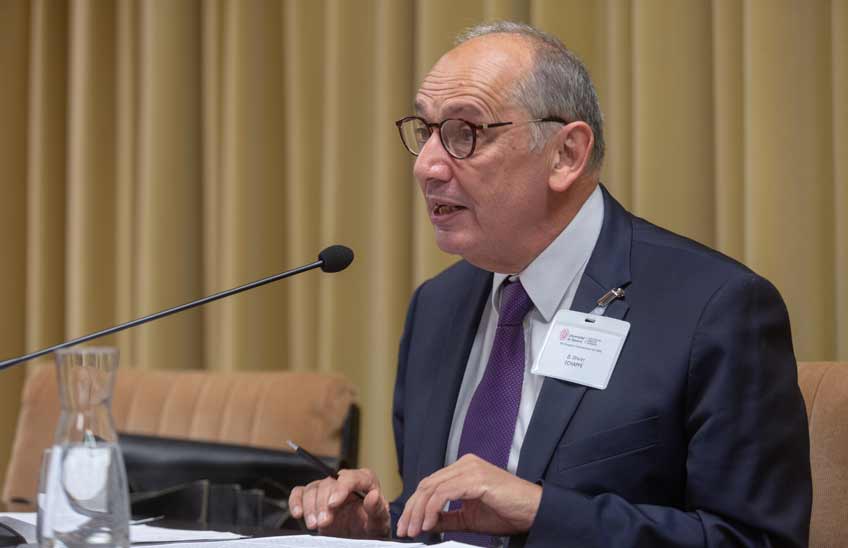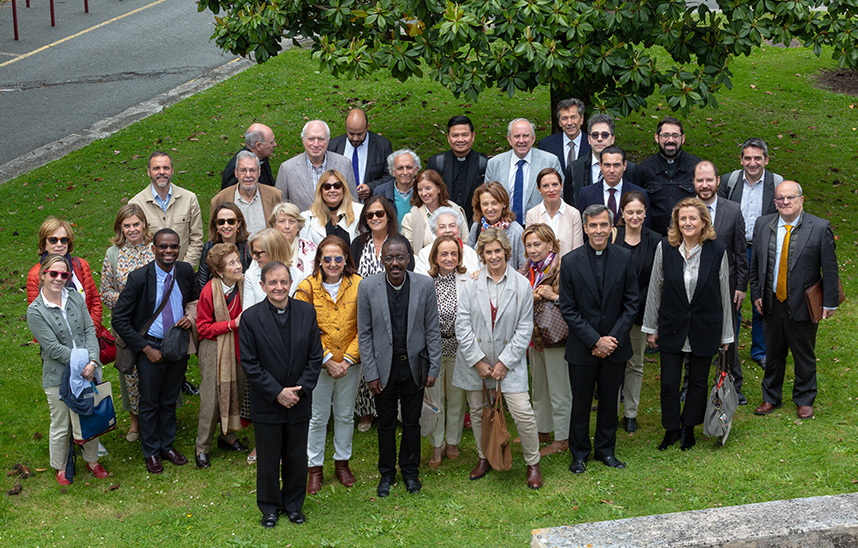"We need to rediscover the beauty of marriage"
The article, published in Omnes, reviews the keys that the speakers María Calvo and Fernando Simón presented at the Omnes Forum "From the essence of marriage: man and woman", in the framework of the activities of the Master's Degree in Matrimonial Law and Canon Procedure at the University
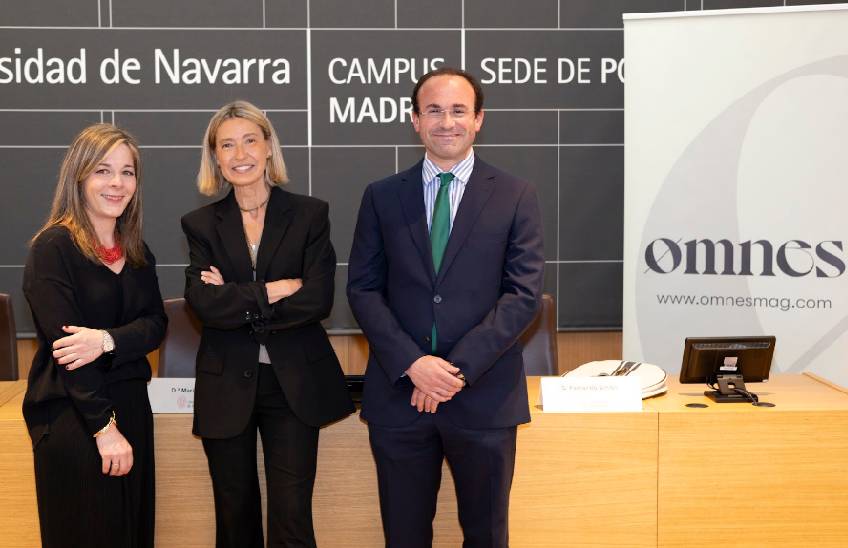
24 | 04 | 2024
[article published in OMNES on April 16, 2024].
On April 15, the Omnes Forum "From the essence of marriage: man and woman" was held, with the speakers María Calvo and Fernando Simón. The guests pointed out that we are currently witnessing a great ignorance of the beauty of marriage, which is manifested, among other things, in not knowing what a man is or what a woman is, in the "absence of the capacity to love", in a "marriage in which we are not in a relationship". core topic emotivist", and in "the substitution of genealogy for technology".
Statistics indicate that more than half of marriages break down in Spain, and in other Western countries there are fees Similar. However, Alvaro Gonzalez, director of the Master's Degree of training Permanent in Matrimonial Law and Canon Procedure at the University of Navarra, he said yesterday afternoon at the Omnes Forum that "there is a feeling that marriage is in crisis, and it is not true."
"We need to rediscover once again the beauty of this authentic wonder of marriage, the reality of marriage from its very nature, to know this reality better and better, to know how to discover beauty and goodness, which are always based on truth," added Álvaro González, who assured Omnes some time ago that "well-prepared professionals are needed to attend and help those who want it." Yesterday he reiterated it: "This Master's Degree It was born with the illusion of contributing to the training of so many people who work in the ecclesiastical tribunals, with the desire to help and provide a training integral."
At the same time, in today's society it is easy to see, to cite just two or three tendencies, fathers who declare that they do not want to "act as parents" when they know their paternity, women in couples, or alone, who decide to have a child by assisted reproduction, dispensing with the man, thus depriving the child of the right to have a child. reference letter or the decrease in the number of young people marrying.
Speakers
It is in this context that this Forum organized by Omnes took place yesterday afternoon in Madrid, together with this Master's Degree at the headquarters of postgraduate program of the University of Navarra in Madrid, moderated by the editor-in-chief of Omnes, María José Atienza, and sponsored by the CARF Foundation, with the presence of its director Luis Alberto Rosales, and Banco Sabadell. The degree scroll It was "From the Essence of Marriage: Man and Woman", and was presented by the aforementioned Álvaro González and the director de Omnes, Alfonso Riobó.
The colloquium was attended by María Calvo Charro, senior lecturer at Administrative Law, professor at the Master's Degree, and author of books on men and women; maternity and paternity, such as "The Stolen Masculinity" or "The Feminine Woman", and by Fernando Simón Yarza, Full Professor Accredited from Constitutional Law at the University of Navarra, and award Tomás y Valiente 2011 for the best work in Constitutional Law.
María Calvo: "We have lost the ability to love"
Professor María Calvo, a mother of four, began by stating that "to talk about marriage is to talk about the solution to many of the social problems that exist today. Why is a married couple separated every second in the developed world?" "Why don't our young people want to get married?" What have we done wrong? What's going on in society?"
"There are many causes, many reasons, but I think we could give a very generic answer, and at the same time very concrete: we have lost the ability to love. We've lost the ability to love because we've lost the knowledge about ourselves." "Without knowledge There is no love, it is impossible to love what we do not know, but the big problem is that we do not know ourselves, not that we do not know the other."
"Anthropological mutation"
"And why don't we know each other?" he continued, "because we have really experienced an anthropological mutation in recent decades. Every historical epoch has a crisis, but I sincerely believe that this epoch has a crisis with a radical novelty that has never occurred before, and that is that mutation of the human being, of the concept of the human being, that new ethics, that new metaphysics that has been imposed on us, that alteration also in the symbolic codes, especially in the symbolic-family codes that have become very liquid: It is the same to be a father, to be a son, to be a man, to be a woman, to be married, to be not married. There's a fluidity there that leads us in the end to anguish."
According to María Calvo, this anthropological mutation "has permeated very easily, very quickly, either because of the technological means that we obviously have, but also because we are using a performative, very manipulative, very theatrical language that is seen in the legislation itself, and this is the danger for young people, which makes concepts and principles that are really degenerate seem very attractive. And it makes them seem very progressive with other concepts and other realities that are really perverse."
Among other examples, the professor and writer considers that "talking about reproductive health to identify abortion is one of those manipulations of language. We are really talking about extreme violence against women and children; And the laws and the administration talk about reproductive health when it is really mental health and spiritual health, because you remove the child from your body but an indelible imprint remains installed in your mind for life, an irreversible fracture in the heart of femininity. That is the language that makes these postulates filter through with such ease, especially among young people."
Three Elements, Three Waivers
"What has this anthropological mutation consisted of? I have been able to detect three elements that are the ones that weave the instructions of our Western civilization: the lack of nature, the Withdrawal to human nature, to sexual otherness, to biology; the Withdrawal rationality and Withdrawal to transcendence. Denatured, without rationality and without transcendence. These are the postulates that sustain the human being now. And they directly affect marriage."
In the opinion of María Calvo, "without nature, without biology, without sexual alterity, thinking that we are equal, identical, interchangeable, that sex is not constitutive of the person and that therefore being a man or a woman depends on a feeling, on the will, and that it is absolutely fluid and that you can choose it; This causes horrific damage to the partner. It is impossible for a marriage to be sustained by thinking that the person next to it is identical, fungible, interchangeable, that they are going to see the world from the same prism that you are seeing it, when there are really differences between the sexes that must be taken into account."
Same, but with differences
"It is true that (men and women) are equal and that we are equal in rights, duties, dignity, humanity and we are equal in IQ, in objectives to be met," said the professor of the University of São Paulo. Master's Degree. "But really, the way of looking at life, the way of loving, sexuality is so different and science has shown it. So not paying attention to this produces conflict, disenchantment and real rupture."
"And when we are father and mother, that is exacerbated because really the neurochemistry of the woman's brain changes, and it changes to protect that child who has arrived so defenseless, and who is a mixture between need and freedom, and also that of the father, because suddenly he becomes protective, he realizes that he has to give security, protection, strengthening that child, and then it is true that differences that at first seemed a little trivial to us, then, when we exercise fatherhood and motherhood, they are greatly exacerbated; But they are necessary for that child, for that child's balance."
Fernando Simón: Subjectivization of Marriage
The Full Professor Fernando Simón Yarza conducted a approach of juridical foundation, to "focus on sexual duality as an essential feature of the institution of marriage", and moved from the analysis of the classical concept "to the emotivist conception". The classic concept has been broken, in his opinion, in the Spanish law 13/2005 (regulation of marriage between people of the same sex), or in the United States in Obergefell v. Hodges (2015).
It is a phenomenon of "subjectivization of marriage. We are faced with a change that radically alters the meaning of the institution, which supposes the radical subjectivization of marriage in the context of marriage. core topic emotive."
"Masculinity and femininity are archetypes, not stereotypes," he said. "They don't allude to a model (typos) that is based simply on a firm social conviction (stereos), but on something that is at the beginning or origin (archē) of reality. So it's impossible to suppress the appeal of sexual duality, precisely because it's an archetype (Peter Kreeft)."
Reproductive Organ, Man and Woman United
Fernando Simón defined marriage between a man and a woman as "a comprehensive covenant of life. Comprehensive organic union (a fascinating expression used by, among others, John Finnis)," he said. "It's organic, it forms a single organ. Unlike the union of the sexes, no other physical union between two persons can form such a unitary organ. The individual is self-sufficient to perform his vital functions (digestive, respiratory, etc.) because he is able to organically coordinate different parts of his body."
"The function of transmitting life, however, is the only one for which the individual is not self-sufficient, but is, to that effect, organically incomplete," he stressed. "Strictly speaking, it is false to say that the individual has reproductive organs. The reproductive organ is the man-and-woman-united. The gift of life transcends the individual, and can only take place naturally in the biological coordination of man and woman forming a single organ. That is why Genesis is not metaphorical when it says that man and woman become one body."
Three Traits of Emotive Marriage
"The new vision of marriage is essentially emotivistic," Fernando Simón stressed at various times, "and is riddled with aporias, contradictions, and is characterized by "three features: affective-sexual union, understanding the sexual as pure coexistence in marriage." contact consensual libidinous care, without the need for complementarity (1), mutual care and support (2), and sharing of domestic burdens (3). The problem is that sexual affection, apart from the structural orientation to life that is proper to marriage, should lack legal relevance," said Simón.
Some consequences of his words are, in his opinion, that "the legalization of the new vision of marriage distorts the conjugal understanding of marriage. Sex is understood, in essence, as libido, but then it is seen as lacking a structural and structural orientation. rules and regulations beyond libido." Second, it "obscures the reality that the Education in a home with a natural father and mother, it favors the development of the child, a thesis endorsed, in my opinion, by common sense, and defended by leading academics. The fight against this common-sense site has been aggressive, and has led to the cancellation of social scientists."
And also, in his opinion, "the obscuration of the correlations between 'conjugal marriage' and 'procreation and procreation' is a major problem." Education of children" leads inexorably to a loss of meaning of a multitude of marital norms based on such a correlation."
In his conclusions, Fernando Simón pointed out that "marriage is an archetype. As such, it cannot be obscured from consciousness. To obscure it in consciousness, one has to do constant violence, to live in continuous violent activism. The law that tries to alter this archetype with fictions constitutes an act of violence against society. It affects people's consciences, confusing them with the object of their desires, with the object of justice, with the truth of things."
Desires are transformed into rights
After Fernando Simón, María Calvo also referred to the second factor destabilizing marriage, which is, in her opinion, "the terrible loss of rationality that we are experiencing. Because right now, and if we look at the laws it is incredible, for example the one on transsexuality, but many others, the abortion law is also included in this emotivism and in this sensibility into which we have fallen and in this annulment of reason."
"We have eliminated reason and sublimated desires to a point where, as one author says, my desire is the law," the professor added. "So, if I don't want to have a child, then I have the right to abortion, that is, desires are transformed into rights. The problem with sublimating desires, feelings, emotions, and nullifying reason is that we cannot love. We cannot love because love is the use of reason."
In her speeches, Maria Calvo analysed sexual otherness: "The problem now is what it means to be a man and what it is to be a woman". "This gender ideology that denies biological differences is doing a lot of damage." "What it is to be a man." Now the boys have culturally adapted to the female archetype, it's loving, empathetic, etc." There is fear of being a man, and what it implies (authority, protection, security)."
"My Time, My Freedom"
In a survey of 2022 from the Valencian Institute of Infertility, 62% of women openly stated that they wanted to be alone, did not want to get married or have children. The reasons were "my time and my freedom." And if they are considering having a child, why do we want marriage, if I can have children alone?, reflected María Calvo, adding that a high percentage of young Spanish women consider being a single mother, without a father, throughout their lives, citing a work of the Valencian Institute of Infertility.
"This dispensing with men has gone to unsuspected extremes," he said at another point. "We don't need men, everything that has to do with motherhood has already been achieved (assisted reproduction techniques): genealogy is replaced by technology."
"If God is lost, we lose ourselves"
As for the loss of transcendence, Maria Calvo pointed out at the end. "If God is lost, we lose ourselves. Because we really emancipate ourselves from the Creator, we fall into the idolatry of the self, then it is my self-referential self, my time, my freedom. In that self-centeredness and narcissism, marriage is impossible, because of what we have said before, love is thinking of the other before oneself as a habit."
In the issue In the May issue of Omnes magazine, you will find these and other issues discussed at the Omnes Forum, including questions from attendees.

